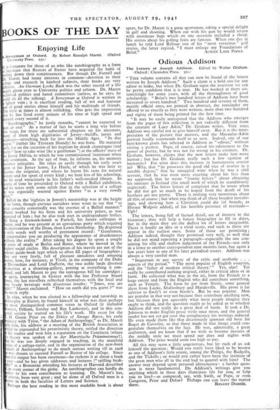Odious Addison
The Letters of Joseph Addison. Edited by Walter Graham. (Oxford: Clarendon Press. 3os.)
"THIS volume contains all that can now be found of the letters written by Joseph Addison." Such a claim is a bold one for any editor to make, but when Dr. Graham signs the assertion we can be pretty confident that it is true. He has worked at them un- remittingly for some years, with all the thoroughness of good scholarship. " Bohn's two hundred letters of Addison have been increased to seven hundred." Two hundred and seventy of them, mainly official ones, are printed in abstract, the remainder are offered to us exactly as they were written, more than two hundred and eighty of them being printed for the first time.
" It may be easily anticipated that the Addison who emerges from the pages of this collection is not radically different from the creature of Lucy Aikin," Dr. Graham writes. Very true; Addison was careful not to give himself away. But it is the inter- pretation of the picture that matters, and the Macaulay-Aikin portrait hardly commends itself to us now. Indeed, one of our best-known poets has referred to Addison as " odious," without raising a protest. Pope, of course, raised his odiousness to the power of poetry, but he was not far wrong in his estimate. Dr. Graham, however, claims that the new letters make him more human ; but has Dr. Graham really such a low opinion of humanity? For what does this increase in humaneness consist in? Why, that "he possesses the good old vice of avarice in a notable degree," that he smuggled wine when he was a civil servant, that he was even more exacting about his fees than we supposed, that he wrote " frantic letters " about obtaining his sinecure in Ireland (the small work of which he scandalously neglected). The bitter letters of complaint that he wrote when he did not get so much as he hoped from the death of his brothers are not pretty. There is nothing very monstrous about all this, of course ; but when you think of all those boudoir moralis- ings, and showing how a Christian could die (of brandy, as Horace Walpole added), of his horrible pretence of rectitude— Ugh !
The letters, being full of factual detail, are of interest to the historian ; they will help a future biographer to fill in dates, but in the main they are .the dullest lot of letters imaginable. There is hardly an idea or a vivid scene, and such as there are appear in the earliest ones. Some of those are promising ; Addison indeed, thought they promised very well, so well that he did not mind repeating a paragraph—especially the one con- taining his silly and shallow judgement of the French—not only in a letter to another correspondent nine months later, but again a few years later in one of his later periodical essays. Addison was always a very careful man.
"Important in any survey of the critic and aesthetic . . . aspects of the period." " The most popular of English essayists, and the father of modern critical theory.' " Yes, alas! Yet really he contributed nothing original, either in critical ideas or in form. He collected what was in the air, from the French to a large extent and from the English who did contribute something, such as Temple. The form he got from Steele, some general ideas from Locke, Shaftesbury and Mandeville. His prose is far inferior to Swift's or even Steele's. But he was popular. Men are popular in that way not because they contribute anything new, but because they put agreeably what most people imagine they ought to think, and the question ought to be asked as to whether Addison did not really do a great deal of harm. It took a Dr. Johnson to make English prose virile once more, and the general reader has not yet got over the complacency his writings induced. He even made them like that disastrously ignorant old boor Sir Roger de Coverley, so that those made in that image could con- gratulate themselves on the fact. He was, admittedly, a great craftsman, and we know that if we wish to become masters of the middle style we must spend our days and nights with Addison. The price would seem too high to pay.
All this may seem a little ungenerous, but let each of us ask himself the question: Would you really have liked to be known as one of Addison's little senate, among the Philips, the Budgells and the Tickells • or would you rather have been the intimate of the great men who all in the end had to quarrel with him? The answer may depend upon personal idiosyncrasy : a further ques- tion is more fundamental. Do Addison's writings give you anything which in these days illuminate life for you, or help you to live?—as compared, say, with Swift, or Pope, or even Congreve, Prior and Defoe? Perhaps one can leave the matter


































 Previous page
Previous page